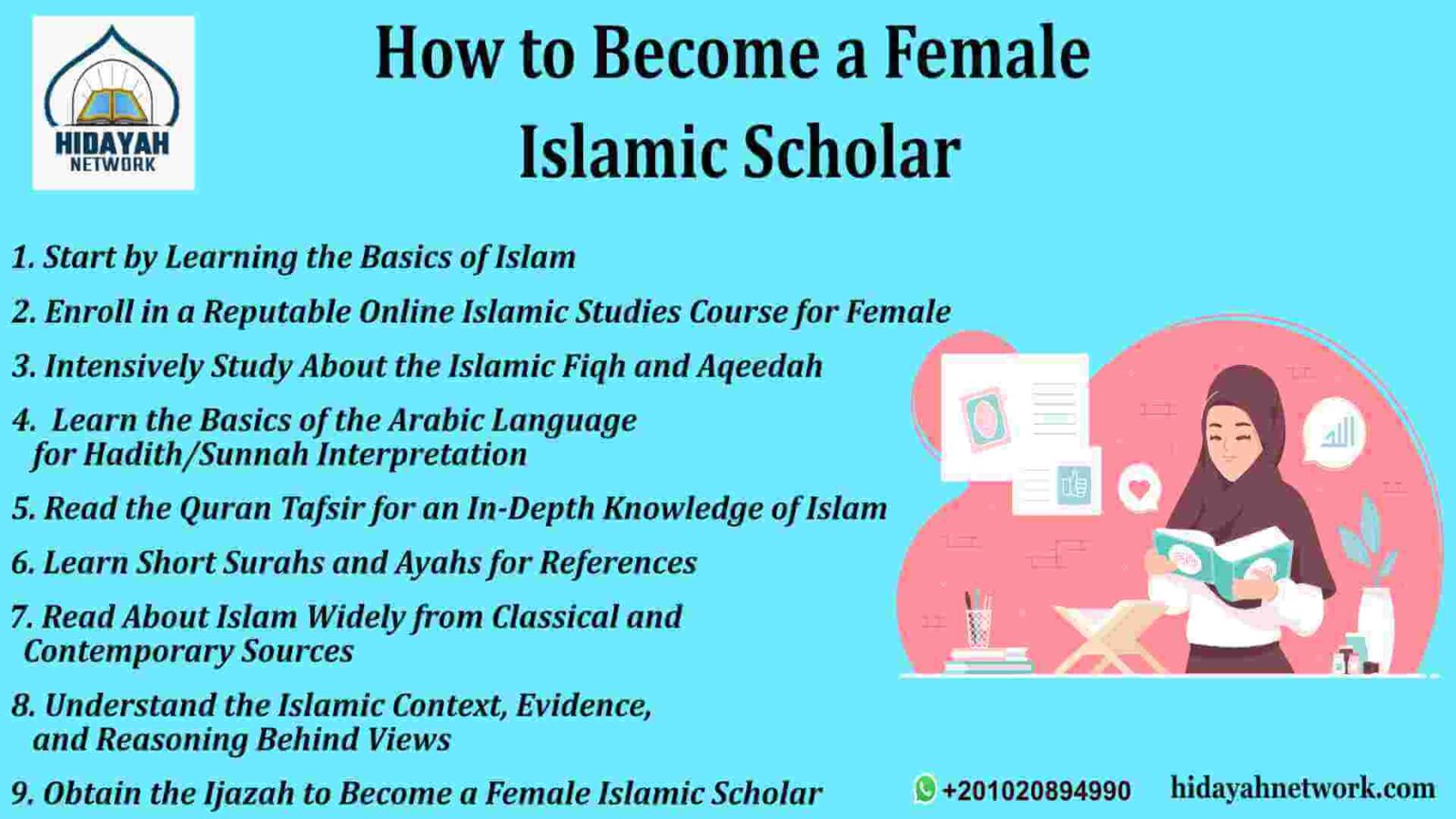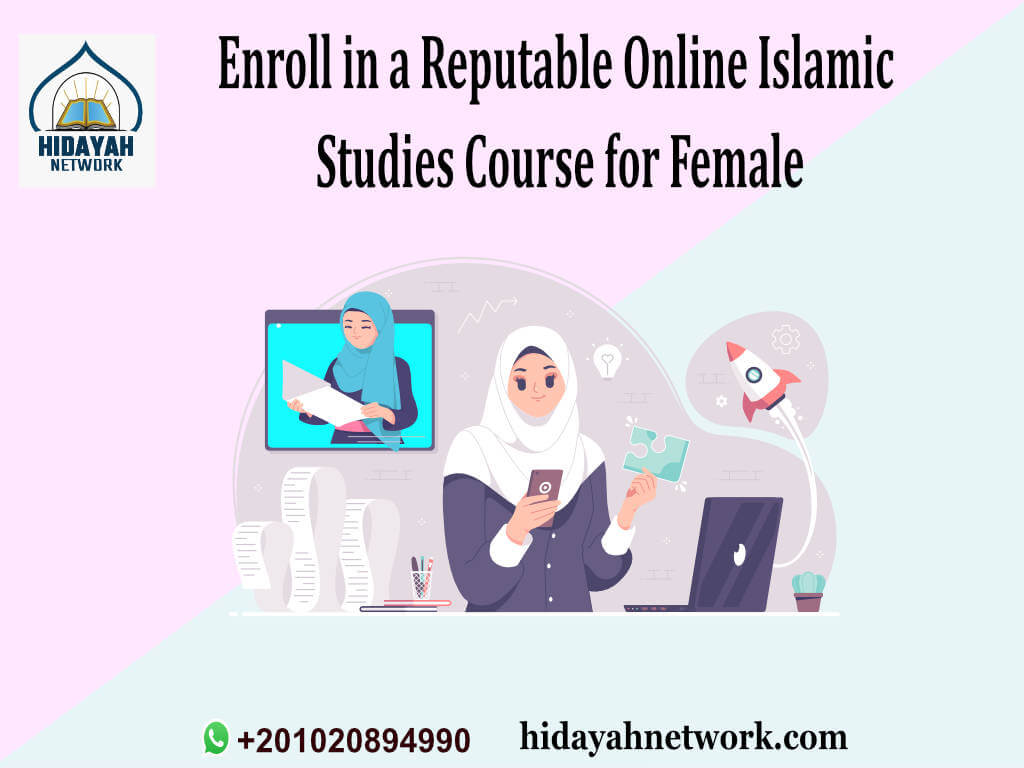How to Become a Female Islamic Scholar

- Hidayah
- Network
- | Role: Hidayah Network

Becoming an Islamic scholar as a female elevates a female’s stature in society. However, if you want to become an Islamic scholar as a female, the journey requires excellent navigation of the Islamic path to achieve this remarkable feat. Today, we will guide you every step of the way so you can become an accomplished female Islamic scholar.
You can begin your journey by learning the basics of Islam. Enroll yourself in online Islamic course for ladies, intensively study the Islamic Fiqh and Aqeedah, learn the basics of the Arabic language for Hadith and Sunnah interpretation, read about Islam from classical and modern sources, and do much more. But all this involves a structured and thorough approach. Let’s guide you in-depth along the way here!
Table of Contents
ToggleStep-by-Step Guide to Become a Female Islamic Scholar
Here’s a step-by-step guide that will help you thoroughly in your quest to become a female scholar:
Step 1. Start by Learning the Basics of Islam
Comprehending the foundational tenets of Islam is paramount for aspiring female Islamic scholars. This knowledge forms the bedrock upon which scholarly pursuits are built, facilitating a profound understanding of Islamic principles, beliefs, and practices.
It equips scholars with the necessary framework to engage in rigorous academic inquiry, interpretation, and dissemination of Islamic teachings.
Key basics include:
- Five Pillars of Islam.
- The Six Articles of Faith.
- The Life and Teachings of Prophet Muhammad (peace be upon him)
- The Quran: Its Revelation, Structure, and Significance
- Islamic History and Civilization
Get 40% OFF Now!
Step 2. Enroll in a Reputable Online Islamic Studies Course for Female

Building upon the foundational knowledge acquired in Step 1, enrolling in online Islamic classes offers numerous benefits for aspiring female scholars. This step allows for flexible learning while providing structured guidance and resources to deepen understanding and expertise.
Key features of a practical Islamic studies course include:
- Comprehensive coverage of Islamic theology, jurisprudence, and history.
- Access to renowned scholars and educators for mentorship and guidance.
- Engaging multimedia resources, including lectures, readings, and interactive discussions.
- Opportunities for practical application through case studies, projects, and assignments.
- Supportive online community for collaboration, networking, and peer learning.
- Certification or accreditation upon successful completion, enhancing credibility and qualifications.
Step 3. Intensively Study About the Islamic Fiqh and Aqeedah
Delving deeply into Islamic Fiqh and Aqeedah is essential for aspiring female scholars. This intensive study equips scholars with the intricate understanding and application of Islamic laws and beliefs, enabling them to interpret and apply religious principles in various contexts.
Islamic Fiqh and Aqeedah include:
- Understanding the sources of Islamic law: Quran, Sunnah, Ijma, Qiyas.
- Exploring the different schools of Islamic jurisprudence (Madhabs).
- Studying the principles of Islamic creed (Aqeedah) and theology.
- Analyzing ethical and moral guidelines derived from Islamic teachings.
- Examining the concept of Islamic worship (Ibadah) and its significance.
- Investigating contemporary issues and their intersection with Islamic law and beliefs.
Narrated by Abu Huraira, The Prophet (ﷺ) said, “The signs of a hypocrite are three: Whenever he speaks, he tells a lie; and whenever he promises, he breaks his promise; and whenever he is entrusted, he betrays (proves to be dishonest).” (Sahih al-Bukhari 33)
This Hadith from Sahih Bukhari illustrates a foundational principle of Islamic jurisprudence (Fiqh) by highlighting the importance of honesty and trustworthiness in Islamic ethics.
Step 4. Learn the Basics of the Arabic Language for Hadith/Sunnah Interpretation
Mastering the basics of the Arabic language is vital for female Islamic scholars aiming to interpret Hadith and Sunnah.
Understanding Arabic facilitates direct engagement with the original texts, enabling scholars to grasp nuances, contexts, and subtleties that may not be fully conveyed in translations.
This linguistic proficiency empowers scholars to conduct accurate analysis, extract legal rulings, and derive moral lessons from the rich reservoir of Islamic tradition.
Step 5. Read the Quran Tafsir for an In-Depth Knowledge

Engaging with Quranic Tafsir involves studying detailed explanations and interpretations of the Quran’s verses. For a female Islamic scholar, delving into Tafsir provides a profound understanding of the Quran’s meanings, contexts, and implications.
Popular and relevant sources for Quranic Tafsir include:
- Tafsir al-Jalalayn: Authored by Jalal ad-Din al-Mahalli and Jalal ad-Din as-Suyuti, this concise Tafsir is widely respected for its clarity and accessibility.
- Tafsir Ibn Kathir: Written by Ibn Kathir, this comprehensive Tafsir draws upon a range of classical Islamic sources to explain Quranic verses thoroughly.
- Ma’ariful Qur’an: Authored by Mufti Muhammad Shafi, this Tafsir offers profound insights into the Quran’s meanings, incorporating commentary from classical and modern scholars.
Step 6. Learn Short Surahs and Ayahs for References
Memorizing short Surahs and individual Ayahs from the Quran is crucial for female Islamic scholars. This practice enables scholars to reference and cite relevant verses during teaching, research, and discussions. It enhances their ability to provide accurate and authoritative guidance on various topics and issues within the Islamic tradition.
Important Surahs for memorization include:
- Surah Al-Fatiha
- Surah Al-Ikhlas
- Surah Al-Falaq
- Surah An-Nas
- Surah Al-Baqarah
- Surah Al-Kahf
- Surah Yasin
Step 7. Read About Islam Widely from Classical and Contemporary Sources
Exploring Islam extensively from classical and contemporary perspectives is vital for female Islamic scholars. This broad reading encompasses traditional texts and modern works, fostering a comprehensive understanding of Islamic thought, history, and practices. It equips scholars with diverse insights and perspectives.
Classical Sources
- Sahih Bukhari and Sahih Muslim
- Al-Ghazali’s Ihya Ulum al-Din
Contemporary Sources:
- “The Quran and the Secular Mind” by Shabbir Akhtar
- “Women in the Qur’an: An Emancipatory Reading” by Asma Lamrabet
Step 8. Understand the Islamic Context, Evidence, and Reasoning Behind Views
For a female Islamic scholar, comprehending the Islamic context, evidence, and reasoning behind various views is essential. This entails delving into Islamic teachings’ historical, cultural, and textual foundations to fully grasp their nuances.
By understanding the rationale and evidence supporting different interpretations, scholars can engage in informed dialogue, provide sound guidance, and contribute meaningfully to Islamic discourse.
It empowers scholars to confidently navigate complex issues, ensuring their perspectives are rooted in authentic Islamic principles.
Step 9. Obtain the Ijazah

To become a recognized female Islamic scholar, obtaining an Ijazah is essential. This formal authorization or certification is granted by qualified scholars, indicating proficiency and competence in Islamic knowledge and scholarship.
Acquiring an Ijazah benefits a female scholar in several ways:
- Validated expertise and credibility in Islamic studies.
- Demonstrates adherence to authentic teachings and traditions.
- Provides recognition within scholarly circles and communities.
- Allows for the transmission of knowledge to future generations.
- Facilitates opportunities for teaching, leadership, and scholarly pursuits.
What Qualifications Should Female Islamic Scholars Have?
Qualifications for a female Islamic scholar often include obtaining formal degrees and certifications from reputable Islamic institutions. Essential qualifications may include:
- Bachelor’s Degree: Typically in Islamic Studies, Arabic Language, or related fields. Duration: 3-4 years.
- Master’s Degree: Offers specialization in Islamic theology, jurisprudence, or Quranic studies. Duration: 1-2 years.
- Doctorate (Ph.D.): Provides advanced research training and expertise in a specific area of Islamic scholarship. Duration: 3-5 years or more.
- Ijazah: Formal authorization granted by qualified scholars, indicating mastery in a particular subject or discipline within Islamic studies. Duration varies depending on the curriculum and requirements.
What is the Highest Rank of a Female Islamic Scholar?
A female Islamic scholar’s highest rank is often called “Aalima.” Aalima is a term used to describe educated religious ladies’ scholars who possess deep knowledge and expertise in various Islamic disciplines, including theology, jurisprudence, and Quranic studies.
These scholars may hold positions as theologians, muftis (canon lawyers), qadis (judges), professors, or high-ranking religious officials within the state. Achieving the rank of Aalima requires years of rigorous study, dedication, and mastery of Islamic knowledge.
Conclusion
Becoming a female Islamic scholar is a journey that requires dedication, education, and continuous learning. By obtaining formal qualifications, such as degrees and certifications, and seeking guidance from established scholars, women can attain expertise in Islamic studies.
Through their knowledge and leadership, female scholars play vital roles in guiding communities, interpreting Islamic teachings, and contributing to the rich tradition of Islamic scholarship.

About Author
Related Blogs
Dive Deeper into Related Topics
